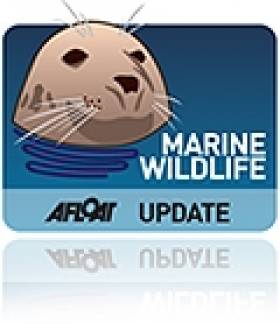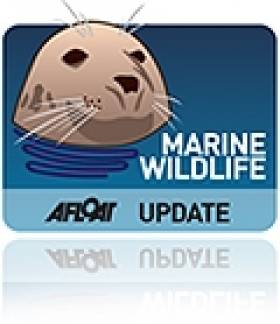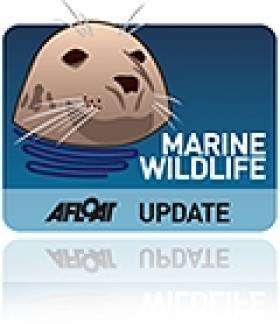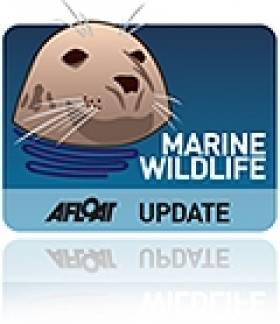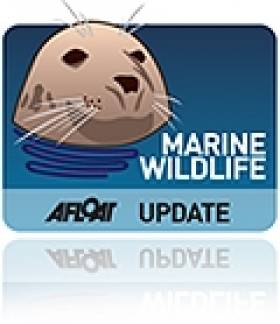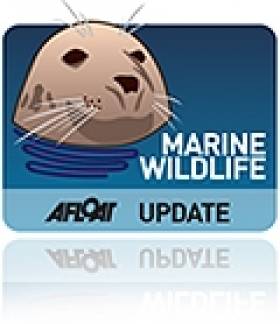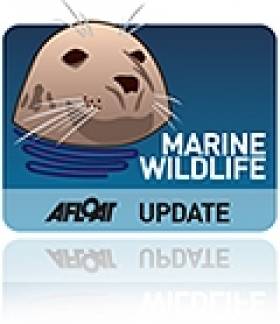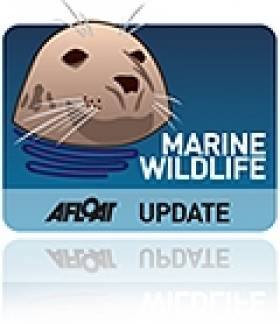Displaying items by tag: marine wildlife
Second Fin Whale Stranding for Sligo
#MARINE WILDLIFE - Sligo County Council is considering its options for disposal after the county's second whale stranding of the winter, when a 60ft male fin whale was beached at Agharrow.
A spokesperson told the Sligo Champion that the whale was in an area known locally as Staid Abbey, lying on a smooth rock ledge that slopes down towards the sea, and is a difficult point to access - particularly in the present stormy conditions.
As previously reported on Afloat.ie, a whale carcass was washed up at the end of last month not far from Agharrow at Raughley. The Irish Whale and Dolphin Group (IWDG) has confirmed that this was the first validated stranding recorded of a fin whale in Co Sligo.
That whale had its flesh removed for fertiliser, while its bones were studied by PhD students from NUI Galway ahead of being buried in a nearby field to allow for the natural decomposition of remaining flesh before future preservation.
Public Needed to Help Record Whale and Dolphin Strandings in UK
#MARINE WILDLIFE - Some 46 reports of stranded whales and dolphins in Northern Ireland are among the thousands recorded across the UK over the last six years, according to BBC News.
A new study co-ordinated by the Zoological Socoety of London (ZSL) shows that some 3,500 cetaceans were stranded on the British coastline between 2005 and 2010.
Though year-on-year figures have fallen overall, is presumed that many more strandings have gone undetected.
Many were found to have died of disease or starvation – particular harbour dolphins.
But human activity such as fishing, shipping and chemical pollution also poses a significant threat to marine wildlife in the waters around the British Isles, said Rob Deaville of the ZSL.
The public is being encouraged to report stranded marine mammals to help create a more accurate picture.
BBC News has more on the story HERE.
Fin Whales Could Be Wexford Bound
#MARINE WILDLIFE - The Enniscorthy Guardian reports that the fin whales that have been sighted off Tramore in recent weeks may soon make their way towards the Wexford coast.
Afloat.ie recently reported that Waterford was the 'best place to be' for whale watching, with the Irish Whale and Dolphin Group (IWDG) confirming fin whale sightings along a 20-mile stretch from Stradbally to Brownstone Head.
Cetacean fans are being advised to keep an eye on the coast from Hook Head to Brownstown headland to catch a glimpse of the fins, which are renowned for their six-foot whale blow.
Whale watchers are also urged to report any sightings to the IWDG online at www.iwdg.ie to help keep its database up to date.
Dead Seals Washed Up at Fethard-on-Sea
#MARINE WILDLIFE - The Gorey Guardian reports that the bodies of two grey seals were found washed up last week on Booley Bay beach, near Fethard-on-Sea in Co Wexford.
The two seal pups were found in an emaciated and malnourished state by a beach walker on 27 November.
According to Irish Whale and Dolphin Group chair Kevin MacCormick, dead seal strandings are not unusual at this time of year, particularly after stormy weather, and grey seals have an especially high mortality rate.
Tramua wounds and blood found on the seals were put down to predation by seabirds.
Seriously Ill Seal Pup Now In Recovery
#MARINE WILDLIFE - A harbour seal pup found in a serious condition in Balbriggan last week is new recovering in the care of the Irish Seal Sanctuary.
Colin, as he has been named by ISS volunteers, was discovered on Kings Beach suffering from blood loss and breathing problems, the Fingal Independent reports.
An ISS spokesperson remarked that it was "very unusual" to find harbour seal pups this late in the year, and in an area dominated by colonies of grey seals.
Thanks to medicine donated by the Dogs Aid veterinary clinic in north Dublin, Colin is now "making great progress" though full recovery will take some time.
The seal pup will remain in the care of the ISS until he is fit enough to be returned to Balbriggan for release.
Whale Carcass Battered by Strong Sea Gales in Sligo
#MARINE WILDLIFE - The Irish Independent reports on the carcass of a whale that was strewn on a beach in Co Sligo after it was swept into rocks by Monday's gale-force winds.
The 13-metre fin whale had been seen recently on a number of occasions in Lough Hyne, a saltwater lake near Baltimore in Co Cork.
On Monday it was spotted at Raughley in the north of Sligo, where it was found beached by Jimmy and Viera Stupakova after the treacherous conditions of the early part of this week.
The find marks the fifth recorded stranding of the species in Irish waters, and the first validated record of a fin whale in Co Sligo, according to OutdoorCommunity.ie.
It is not yet clear how the juvenile met its end, though initial investigations point to the whale not being long dead.
The Irish Independent has more on the story, including video, HERE.
Irish Sea Conservation Zones Shelved Till 2013
#MARINE WILDLIFE - Some 14 Marine Conservation Zones in the Irish Sea are among the network of planned marine wildlife sanctuaries around the UK that has been postponed.
The Liverpool Echo reports that the UK Department for the Environment, Food and Rural Affairs (Defra) has shelved plans to create the conservation areas by the end of 2012 after pressure from "groups that use the coastline frequently including fishermen, yachting enthusiasts and seaside villagers".
There will now be a six-month delay while and impact assessment on the network of well over 100 proposed sites is presented to the British government.
As previously reported on Afloat.ie, conservation groups have raised concerns that fewer than a quarter of the proposed sites around the UK will receive official protection.
Groups Concerned Over UK Govt Plans for Marine Conservation Zones
#MARINE WILDLIFE - Conservationists in the UK have voiced their concern that Westminster will enact fewer than a quarter of the proposed Marine Conservation Zones in British waters.
The Press Association reports that some 127 such zones - including parts of the Irish Sea - have been earmarked by regional conservation groups as areas requiring special environmental protection.
All 127 proposals were reviewed by an independent panel of scientists and government committees before they were to go on public consultation.
But it is now feared that a mere 23 of the total will get the go-ahead, due to a perceived lack of evidence to support the case for the rest.
"To only designate 23 marine conservation zones is equivalent to switching off the life support for our seas," commented Joan Edwards of the Wildlife Trusts.
The Press Association has more on the story HERE.
Dolphin Rescued in Co Wexford
#MARINE WILDLIFE - A stranded dolphin was rescued at Duncannon on Monday last week, the New Ross Standard reports.
After being spotted by a member of Fethard-on-Sea RNLI, the dolphin was aided by the lifeboat crew, with advice from the Irish Whale and Dolphin Group.
The juvenile dolphin, who appeared to show no distress from the incident, was taken out to see and released in deep water off Templetown strand.
A spokesperson for Fethard-on-Sea RNLI said the crew were "'especially pleased to have undertaken such a rescue mission with a successful outcome".
Wildlife Groups Pledge Union With Oil Spill Response Plan
#MARINE WILDLIFE - The Evening Herald has highlighted the work of a new union of wildlife protection groups which is training volunteers to act the event of serious environmental threats to Ireland's sea bird population.
Wildlife rescue volunteer Pauline Beades from Garristown in north Co Dublin has been working with Ireland's animal groups to change the official approach to wildlife - particularly birds - that get caught in oil spills.
The Irish Seal Sanctuary, Birdwatch Ireland, the ISPCA, the Irish Whale and Dolphin Group (IWDG), Coastwatch and Irish Wildlife Trust have written a joint "letter of comfort" for the Irish Coast Guard, which is the State body charged with dealing with coastal oil spills.
The groups have pledged to work together in the event of any oil spill that involves a threat to marine wildlife.
Their response plan involves an initial wave of volunteers walking beaches to gather affected animals and providing first aid, followed by transfering them to veterinarians in specialised field hospitals, as well as facilities for longer-term care.
Recently Beades helped train volunteers in Limerick, who also attended lectures and demonstrations from visiting wildlife rescue experts from Europe to prepare for any potential sea-borne wildlife emergency.


























